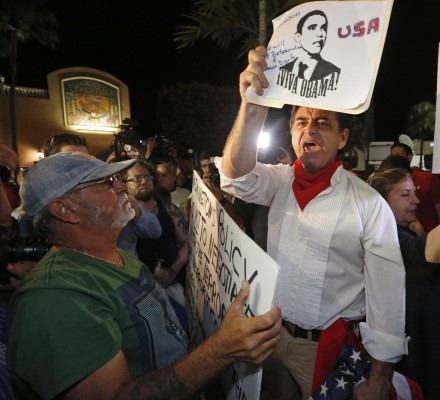President Obama: Cuba Is Not Your Example

Al Diaz
President Obama supporter Peter Bell, right, debates with anti-Obama demonstrators at Versaille’s Restaurant in Miami on Wednesday, Dec. 17, 2014, after President Obama’s decision to normalize relations between Cuba and the United States. (AL DIAZ/Miami Herald/TNS)
January 28, 2015

I’m a Cuban myself—my mother and her parents, four sisters, two cousins, four nieces, two nephews, are all first-generation Cuban. Family gatherings are loud, and I know my way around a train of dominoes. And what I’ve noticed about those who share my heritage is that I’ve never met a Cuban that did not claim to love this country better than any other, regardless of political affiliation. That doesn’t mean that ones that do so do not exist, but my inability to meet one in my life has always been significant to me. I learned early on that once Cubans get here, they can be more American than Americans.
I mention this anecdote only to emphasize how significant Cuban-American grievances are, and I kept this in mind when examining the recent developments in Cuban-American relations that President Obama has undertaken. In complete secrecy, Obama’s administration engaged in negotiations with Cuban officials about fully restoring diplomatic relations between the countries, re-establishing trade, exchanging prisoners back to their home countries and opening up more avenues for travel to and from the island over the last year and a half. With Pope Francis encouraging both Obama and dictator of Cuba, Raul Castro, to continue the search for a solution, the negotiations culminated in a finalized agreement between the two heads of state. Congress as a whole didn’t know what to make of it, but Cuban lawmakers had no problem reacting immediately.
It’s worth nothing that criticism of this issue crossed party lines. Indeed, Cuban-American Senators Bob Menendez (D-NJ) and Marco Rubio (R-FL) both strongly condemned these developments and the president’s actions. One could almost see the confusion on Obama’s face when reading about the opposition. Isn’t the mending of Cold War-era foreign relations after half a century of turmoil supposed to look like a good thing?
And that is what he was hoping for—it’s just that Cuban-Americans can tell it was the only thing he was hoping for. The United States has little to gain from Cuba by reopening trade—they’re the ones needing resources to catch up with the rest of the world. So why mend relations? Obama needed a win in the foreign policy department after last year’s string of losses in Europe and the Middle East. It makes sense that he would look toward the seemingly least offensive and most progressive option for helping repaint the United States as a nation that can accept peaceful alternatives to outdated belligerent policies. However, the administration did it in secret because even they knew that pulling such a move on a country with a reputation like Cuba’s meant they weren’t going to get away without a scratch. So here these Cuban-Americans are, scratching away. They feel betrayed.
And they should, because other than a few flimsy phrases scattered through the announcement, not one word has been said about efforts to improve human rights in the country. Doing so would mean admitting that we had just agreed to normalize relations with a country that still commits atrocities to its people. Yes, the United States deals with worse countries on a daily basis—that doesn’t give us permission to continue doing so. Will providing Cuba with resources and engaging with its people lead to progress in the future? To be fair, it’s likely. But if it does happen, it won’t be because that was Obama’s intention. It took the Pope’s intervention to bring both sides to table, years after he claimed he wanted to improve relations with Cuba. If Obama was going to do it at all, he was going to do it for himself— and that’s exactly what happened.
But regardless of intention, is this a step in the right direction? Yes and no. The embargo was well-intentioned but is now outdated and even appears cruel with our current diplomatic relations restored. Critics of aiding the country seem cynical when they claim that lending our resources to Cuba will only ensure that those in power will keep everything for themselves— after all, we’ll never know that for sure if we don’t try. But the problem here is that we aren’t being explicit enough about our intentions to help Cuba’s people. As a nation, we aren’t promising any interventions in the name of humanitarian progress in the announcement of our policies, even to our own people. Therefore, I cannot support Obama’s actions. This ignorance is a colossal elephant in the room, and it needs to be addressed while Cuban-Americans are angry.
Because beneath that anger is a desperate need for reassurance. Being a Cuban immigrant means struggling to get off the island, fighting the coast guard every step of the way, scraping through the job market, enduring any racist stereotypes that may come— all to call America their home. Now that their original homeland is being so inconsiderately dealt with, they are becoming defensive—and rightfully so. Most of them have family, friends, a whole life they abandoned in favor of this country of opportunity. We need to let them know that Cuba is not just Obama’s example to the international world and promise that things are going to get better. We need to let them know that we’re going to try our best to make things better for the people they left behind.









